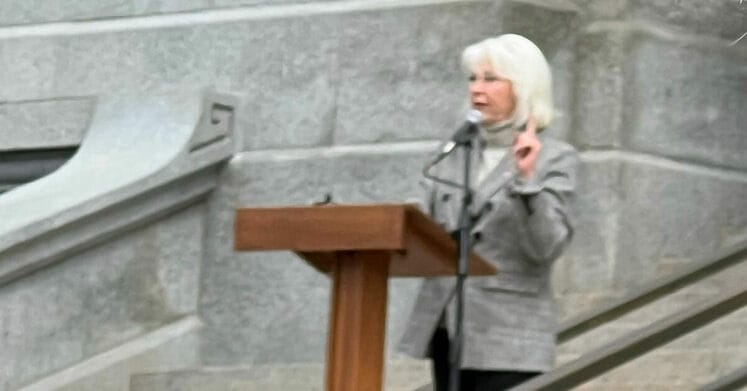Industrial and manufacturing operations clean air grant program. Section 1 of the bill creates the industrial and manufacturing operations clean air grant program (clean air grant program) through which the Colorado energy office (office) awards grant money to private entities, local governments, and public-private partnerships for voluntary projects to reduce air pollutants from industrial and manufacturing operations.
Voluntary projects eligible for grant money include:
- Energy efficiency projects;
- Renewable energy projects;
- Beneficial electrification projects;
- Transportation electrification projects;
- Projects producing or utilizing clean hydrogen;
- Projects involving carbon capture at industrial facilities;
- Methane capture projects;
- Projects producing or utilizing sustainable aviation fuel; and
- Industrial process changes that reduce emissions.
Starting in 2025, the office is required to report annually on the progress of the clean air grant program, submit the report to the legislative committees with jurisdiction over energy matters, and post the reports on the office’s website.
On June 30, 2022, the state treasurer shall transfer $25 million from the general fund to the industrial and manufacturing operations clean air grant program cash fund, which fund is created in the bill. The fund may also consist of money from federal sources and from gifts, grants, and donations. The money in the fund is continuously appropriated to the office for its administration of the clean air grant program.
The clean air grant program is repealed on September 1, 2029.
Community access to electric bicycles. Section 2 creates the community access to electric bicycles grant program (electric bicycles grant program) through which the office awards grant money to local governments and nonprofit organizations that administer or plan to administer a bike share program or an ownership program for the provision of electric bicycles in a community. Section 2 also creates the community access to electric bicycles rebate program (rebate program) through which the office provides individuals in low- and moderate-income households, or bicycle shops that sell electric bicycles to program participants at discounted prices, rebates for purchases of electric bicycles used for commuting purposes.
Starting in 2025, the office is required to report annually on the progress of the electric bicycles grant program and the rebate program, submit copies of the report to the legislative committees with jurisdiction over transportation matters, and post the report on the office’s website.
On June 30, 2022, the state treasurer shall transfer $12 million from the general fund to the community access to electric bicycles cash fund, which fund is created in the bill. The fund may also consist of money from federal sources and from gifts, grants, and donations. The money in the fund is subject to annual appropriation by the general assembly to the office for its administration of the electric bicycles grant program and the rebate program.
The electric bicycles grant program and the rebate program are repealed on September 1, 2028.
Diesel truck emissions reduction grant program. Section 3 creates the diesel truck emissions reduction grant program (diesel trucks grant program) through which the division of administration (division) in the department of public health and environment (department) awards grant money to certain private and public entities for decommissioning diesel trucks and replacing the trucks with newer model trucks. The division is required to determine eligibility for the grant money and the eligible fuel types for qualifying as a replacement vehicle under the diesel trucks grant program.
Starting in 2023, the department is required to report annually on the progress of the diesel trucks grant program and submit a copy of the report to the legislative committees with jurisdiction over energy matters.
On June 30, 2022, the state treasurer shall transfer $15 million from the general fund to the diesel truck emissions reduction grant program cash fund, which fund is created in the bill. The fund may also consist of money from federal sources and from gifts, grants, and donations. The money in the fund is subject to annual appropriation by the general assembly to the department for use by the division for its administration of the diesel trucks grant program.
The diesel trucks grant program is repealed on July 1, 2032.
Electrifying school buses grant program. Section 3 also creates the electrifying school buses grant program (school buses grant program) through which the department, with technical assistance from the office, awards grant money to school districts and charter schools to help finance the purchase and maintenance of electric-powered school buses, the conversion of fossil-fuel-powered school buses to electric-powered school buses, charging infrastructure, and upgrades for electric charging infrastructure and the retirement of fossil-fuel-powered school buses.
Starting in 2025, and every odd-numbered year thereafter, the department is required to report on the progress of the school buses grant program, submit copies of the report to the legislative committees with jurisdiction over education and transportation matters, and post copies of the report on its website.
On June 30, 2022, the state treasurer shall transfer $65 million from the general fund to the electrifying school buses grant program cash fund, which fund is created in the bill. The fund may also consist of money from federal sources and from gifts, grants, and donations. The money in the fund is subject to annual appropriation by the general assembly to the department for its administration of the school buses grant program.
The school buses grant program is repealed on September 1, 2034.
Section 4 updates the definition of “federal act” regarding the reference to the federal “Clean Air Act”. Section 4 also updates the definition of “issue” with respect to an order, permit, determination, or notice issued by the division, to remove certified mail and add electronic mail as options to issue such order, permit, determination, or notice.Section 5 clarifies that the statutory fee caps for fees collected by the air quality enterprise apply only to the annual stationary source emission fees. The statutory fee caps are $1 million for state fiscal year 2021-22, $3 million for state fiscal year 2022-23, $4 million for state fiscal year 2023-24, and $5 million on and after July 1, 2024.Section 6 removes the requirement that the division make the forms on which a person provides details necessary for filing an air pollution emission notice available at all of the air pollution control authority offices.Section 7 extends the time within which the commission must grant or deny a request for a hearing from within 15 days after the request was made to within 30 days after the request was made.
Existing law authorizes the commission to submit any additions or changes to the state implementation plan (SIP) to the administrator of the federal environmental protection agency (administrator) for conditional or temporary approval pending legislative council review of the additions or changes. Section 8 authorizes the commission to submit the changes or additions to the administrator as a provisional submission, pending possible introduction and enactment of a bill to modify or delete all or a portion of the commission’s additions or changes to the SIP.Section 9 makes a conforming amendment.Section 10 appropriates the money transferred from the general fund to the cash funds created in sections 1, 2, and 3 to the office, the division, and the department for their administration of the programs described in sections 1, 2, and 3. Additionally, section 10 appropriates from the general fund:
SB22- 193 Air Quality Improvement Investments is sponsored by Democrats. Sponsors are Senator Stephen Fenberg, Senator Julie Gonzales, and Representative Alex Valdez.
Alessandra Lavallee returns to the Kim Monson Show and joins Kim as the featured guest, Lavallee and Kim discuss compliance, the Election Integrity rally, metro Denver infrastructure, and more.



Responses